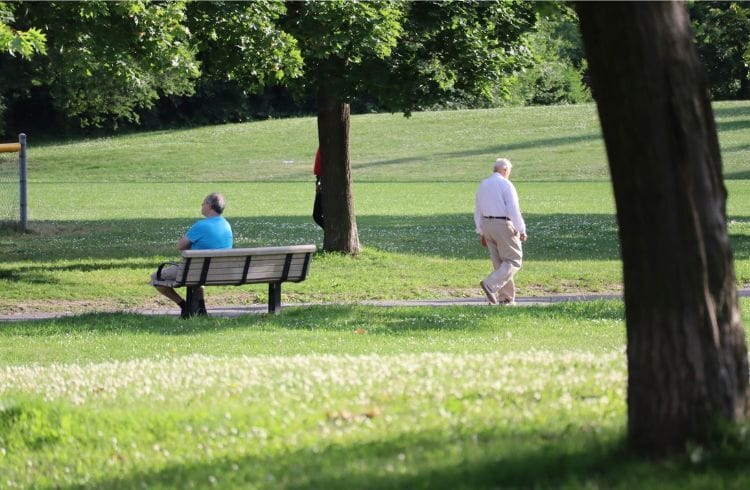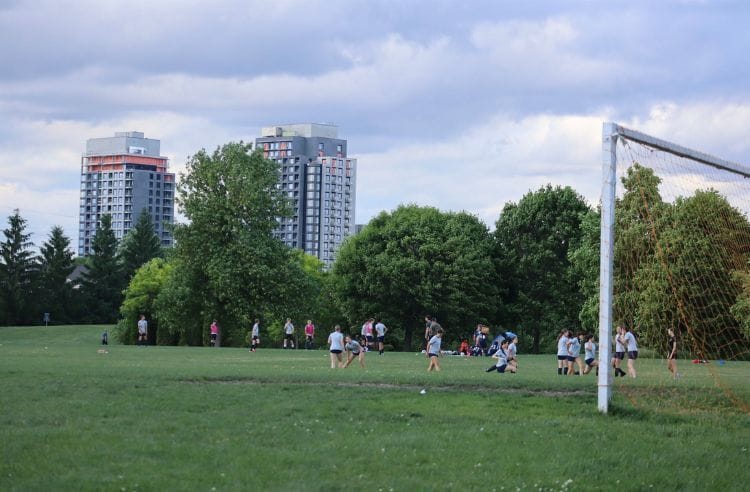There is the sound of laughter wafting through Centrepointe Park as children play on swings and splash in the waterpark. Nearby, soccer teams of all ages are getting their kicks in. At the baseball diamonds, teams are warming up for the season. But there is growing concern in the community that all or some of this could one day be lost due to new city zoning.
Area councillor Laine Johnson said she understands the residents worry, but says the park is still protected.
Centrepointe Park is currently zoned as Open Space and Leisure Zone, but under the proposed changes, it would change to a Recreation Zone.
What does that mean? The greenspace could then technically be used for various new purposes such as: shelters, amusement parks, artist studios, community centres, day care, fairgrounds, golf courses, indoor entertainment facilities, libraries, museums, places of assembly, recreation and athletic facilities, schools, sports arenas, and theatres.
While the threat of development is raising eyebrows, Johnson says the city has no intentions of getting rid of greenspace – in fact it wants to create more.
“The thing is that our parkland is governed by the Parks and Recreation Master Plan that maps out all the parkland across the city. Centrepointe Park is essentially built out at this time, there is no plan for it to ever get a community centre because of its proximity to the Pinecrest Recreation Centre and then Ben Franklin Place. It wouldn't make sense to put an additional community centre there,” Johnson told the Ottawa Lookout.

Centrepointe Park has 34 acres of greenspace in the heart of a well developed suburb. Photo by Charlie Senack.
The local community fears the worst
“Similarly, in the Parks and Recreation Master Plan, the city does not build amusement parks nor do they build indoor theatres or schools, so that would never be permitted under the master plan as well,” she added. “That parks and rec plan also talks about how much greenspace you need to provide for a certain number of residents, it tells us where future basketball courts will go or future aquatic facilities will go, and it's a calculation across the whole city to make sure that every neighbourhood gets a little bit of what they need.”
But those reassurances are not enough for the neighbourhood residents. In April a petition was started which has garnered over 820 signatures. In the comment section, one resident said, “the wording of the new zoning is very vague and risks fundamentally changing the character of the park.”
Another said he moved to Centrepointe because of the large park.
“The park is heavily used by various sports teams, families with kids, [and] community groups. Lately, three high-rise condos/rentals got erected near the park; once tenants move it, there will be twice as many people using the park,” said the resident. “Do not overpopulate this green and airy park any further; do not turn it into Lansdowne Park concrete jungle!”
Jennifer Stoyle, the Centrepointe Community Association’s representative for zoning issues, said there is always the concern that other parameters could change in the future which would further weaken the park's protections. She also feels there is a large difference between a park with playground equipment and an amusement park with rides.
“The city is merging together parks and recreational facilities. I think people would agree that a dance studio is not a park,” she told the Ottawa Lookout. “And if you read the official plan, it says if you build a recreational facility near transit, you should also build housing on top of that recreational facility.”
Johnson has indicated that there are also no plans to build housing on the park and also noted the city has rules which prohibit parkland being sold for private use.

Baseball players enjoy some time at Centrepointe Park in mid June 2025. Photo by Charlie Senack.
But Stoyle asks what happens as the city grows?
The amount of usable land is decreasing, she noted, and the Centrepointe community is growing. New apartments are going up just steps away from the greenspace. Work is underway on both the Algonquin Station and Baseline/Merivale Secondary Plans, which could see rapid intensification eventually come to the Nepean suburb. Light rail is also expected to start rolling through the community by 2027.
“As our population in Centrepointe grows, our population could double from its current 7,000, or even triple,” said Stoyle. “We will get the population which gives us the need for more recreation facilities. And under the residential zoning changes, you're going to have fewer front and rear yards. With that, city greenspaces are going to become even more important.”
So what is the solution?
The current Algonquon Station and Baseline Secondary plans would actually be a way of finding ways to add more greenspace, Johnson noted. For example with the recent Pinecrest-Queensview Secondary Plan, three new parklands south of the Queensway have been identified to keep up with the future growth.
Johnson said she has committed to the community association that a solution of some kind will be found. The whole purpose behind changing the zoning in the first place is to create consistency and ensure there are fewer codes. Many areas of the city have differing rules because they were created before amalgamation.
The safeguarding of greenspace could come in varying forms, but Johnson said she doesn't want it to be a “rubber stamp exemption” just for Centrepointe Park.
“Centrepointe Park is a district park. There are other district parks across the city. Perhaps there could be a different application of the zoning for those types of parks,” she said.
The city is currently on draft two of the zoning bylaw. Residents are able to give feedback on the Engage Ottawa website until June 30. The final draft will then go before council for approval.





